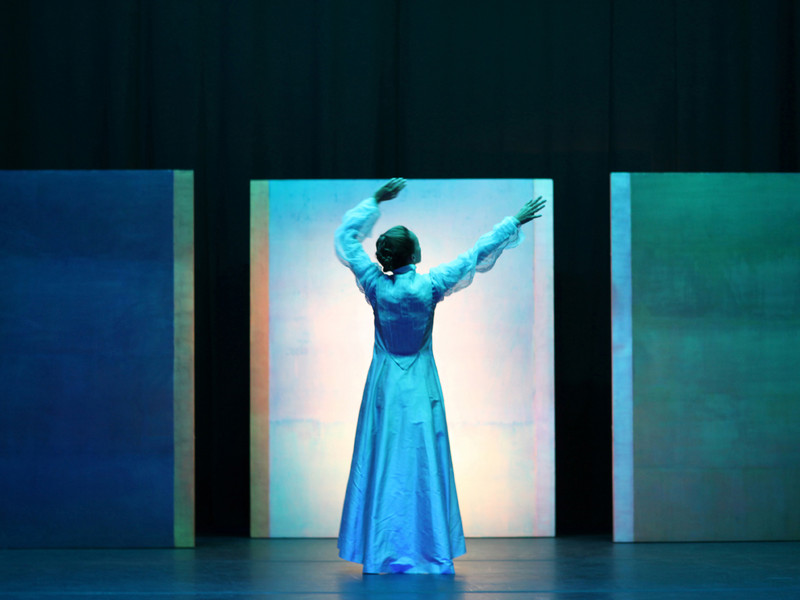“Eurythmy works – without any prior knowledge or experience!”

More than 100 years after its foundation, the movement art of eurythmy is currently facing challenges. While Waldorf schools worldwide are looking for pedagogically trained specialists to teach eurythmy, career prospects in the field of stage eurythmy are precarious, not to mention tense in the field of eurythmy therapy. Despite all the training programmes and efforts to work out the concrete contribution of eurythmy in society and medicine, it is still considered a fringe subject and eurythmy has hardly emerged from its niche.
But in various places, people are instigating initiatives for a contemporary renewal of eurythmy – such as the eurythmist and cultural manager Vera Koppehel. She works as a performer, therapist and eurythmy lecturer in Basel and Copenhagen. Together with SAGST, she has been developing a concept for business eurythmy for the past several months. In this interview, she talks about the questions that guide her in her work.
How did your collaboration with SAGST come about?
Vera Koppehel: First of all, by designing the Foundation’s annual meeting in January 2020. I was invited along with the musician and conductor Robin Engelen to work with the employees for two days. The feedback round was overwhelmingly positive. The participants experienced the great potential of eurythmy and wanted to continue.
For me, it is clear: Eurythmy works – without any prior knowledge or experience! Anyone can get into it because it touches on issues common to all humans. I have been developing special exercises that use this direct, unambiguous access from the universal to the individual. During the annual meeting, we were able to try out such exercises together – which was also a wonderful opportunity for me to test their effect more precisely.
What happened next?
Vera Koppehel: I was asked to develop a concept for business or corporate eurythmy for the Foundation. Two aspects should play a role in this. On the one hand, there is the healthcare level: eurythmy therapy as healthcare, both in workshops and individual lessons. The second level involves my way of understanding eurythmy as a meditative process-oriented approach to worldly insight and self-awareness – also in the corporate context. In my experience, every person has a deep longing within themselves to find a certain inner peace in their life. We want to be anchored in ourselves, authentic, which gives us confidence. That implies, in particular, the search for one’s own purpose. Companies also must ask themselves: What is our mission in the world? What is our role? And what skills do our employees need in order to be able to think, feel and take action in their demanding everyday life, creatively as well as constructively?
How can eurythmy help with these questions?
Vera Koppehel: Eurythmy enables knowledge through movement, so it goes far beyond the ostensible workshop events or verbal coaching. One could say: The whole develops an inner, emotional side. The result is a kind of training scenario in which everyone can work on their own development. The focus here is on uncovering each individual’s creative potential. This is also our stance for teaching at the Institute for Inspired Movement in Copenhagen, where we are breaking new ground with the “FLOW&U” training programme.
Who is this training programme for?
Vera Koppehel: We focus above all on people who are already living busy lives and have the desire to start something new professionally with eurythmy. For instance, motivated educators who want to enrich their subject with inspired movement, but also non-medical practitioners or nurses who are interested in healing eurythmy, or farmers who are curious about how eurythmy could be used in agricultural companies. For these people, a traditional, as lengthy as it is expensive, full-time study of eurythmy is hardly feasible – it just doesn’t fit into their lives. Every year, no more than about a hundred people worldwide graduate. A high percentage of the graduates do not take up the profession at all, and there are a few who enter the profession but do not pursue it in the long term. This is more than just a business fiasco.
What conclusions do you draw from this?
Vera Koppehel: We do not see eurythmy as an end in itself but as a tool for the world or the field in which each person works. That is why we rely on an effective practice-oriented training programme and motivate the students to integrate eurythmy into their professional and private environment from the very beginning. And the beauty of it is that this is absolutely in line with our students’ impulses – they do it in any event, without any hesitation.
The I.I.M – Institute for Inspired Movement in Copenhagen, Denmark, is a platform for research and training in movements and consciousness. Under the name FLOW&U, it offers a part-time, practice-oriented eurythmy training programme. The Michael Foundation, another initiative of our founder, Dr. h.c. Peter Schnell, promotes the development of the training programme for three years. The training takes place across all levels and the teaching is in English, Danish and German. The name FLOW&U is inspired by Otto Sharmer’s “Theory U – Leading from the Future”. The “U” symbolises a deepening, flow for the way to enact it.
Vera Koppehel is a qualified eurythmist with two Masters of Arts from Alanus University in Alfter in Stage Art and Eurythmy Therapy. She works as a performer and cultural manager while also running a practice for healing eurythmy in Basel. Since 2018, she has been a member of the Leadership Team and a Lecturer at the I.I.M – Institute for Inspired Movement in Copenhagen.
